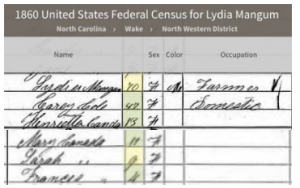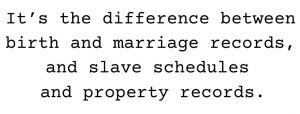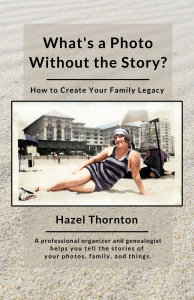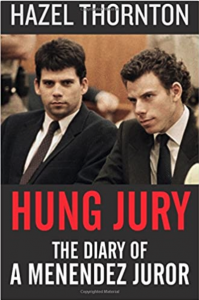Black Lives Matter in Genealogy Too

Lydia Mangum, age 70, living with 4 young granddaughters and domestic Carey Cole in 1860 North Carolina.
I recently saw this example of white privilege:
Ugh! That one really hit home.
Genealogy research for the descendants of black slaves differs greatly from that of the descendants of their white owners.
I knew, of course, that many African-Americans whose families have been here for a long time, and who want to trace their history, must brace themselves to learn (if they didn’t already know) that their ancestors were enslaved. And be prepared for the trail (to Africa, and to the rest of their history) to likely stop right there. Where did their ancestors live, and when? Who were their enslavers? Are there any records that include names (like some wills do), or are they only represented by numbers (like on slave schedules)? Did they take their owners’ last names? Are there manumission papers (granting their freedom) available for viewing?
The sadness of not having traditional birth and marriage records available for genealogy research (such as they were in that era) is just the tip of the unacceptable, far-reaching-consequences-of-slavery iceberg.
Slaveholders in the family
Meanwhile, my own family has lived here in America for so long that I was bound to eventually encounter ancestors with slaves. All immigrants on my pedigree chart predate Ellis Island – which opened for immigration in 1892 – some by more than a couple of centuries. I wasn’t crazy about confirming a branch of such ancestors in antebellum North Carolina, but what’s a 21st-century white girl gonna do? (Besides learn as much as she can about being anti-racist in the 21st century, that is.)
Then it got interesting.
A particular ancestor caught my attention.
My 4th great grandmother, Lydia Ferrell Mangum (of whom I’d never heard before researching), was a wealthy woman. She inherited land from her father, which helped make her husband rich. She re-inherited everything from him when he died. She owned slaves.
AND…in the 1860 Wake County, North Carolina census… she is listed as M (mulatto). Which, of course, means half-black. (In this article I am not capitalizing white, black or mulatto — except in book and article titles — because the applicable census column in 1860 was labeled “Color”, not Race. Also, I’m using “mulatto” in reference to the same census record.)
Wait, what?
This discovery had me Googling topics such as:
- Did Black People Own Slaves? – The Root, an article by Henry Louis Gates Jr. (Spoiler alert: Yes, they did!)
- Why Is My White Ancestor Listed as Black in the Census? – The Root, another article by Henry Louis Gates Jr. (host of PBS’s Finding Your Roots)
Could the census-taker have been mistaken, or just done sloppy work? Yes, of course, he could have. As indispensable as census records are to a genealogist, they are famously riddled with errors that keep us on our toes! Who knows what she looked like to a census taker? Who knows who answered the door and what they reported or looked like?
What if it’s an error?
BUT… if she was NOT “mulatto”, someone’s going to have to tell the authors of these publications, all of which mention my 4th great grandmother by name:
- The Free Negro in North Carolina, 1790-1860, by John Hope Franklin, 1971, 1995, 2000
- America’s Forgotten Caste: Free Blacks in Antebellum Virginia and North Carolina, by Rodney Barfield, 2013
- We Specialize in the Wholly Impossible: A Reader in Black Women’s History, Darlene Clark Hine, Wilma King, Linda Reed, 1995
- The Two Faces of Dixie: Politicians, Plantations and Slaves, by J. Christy Judah, 2009
- Black Property Owners in the South, 1790-1915 by Loren Schweninger, 1990
Which begs even more questions:
So many questions!
Could all those historians be wrong?
- Yes, they could be. Lydia is listed as W (white) in the 1870 census. And a lack of designation in 1850 implies she’s white. If one misreads the 1860 Slave Schedule, one might think she is black, instead of noticing that the B refers to the first of the slaves listed right next to her name. But that doesn’t prove the census-takers and the historians are wrong, either. Maybe there’s more evidence that I haven’t seen yet?
Do I care if Lydia might be of African descent?
- Certainly not! Not except for the historical interest of it, and the desire to be accurate in my research.
Will I be perceived as racist for wanting to do further research? Or even for writing this blog post?
- I don’t know. Maybe. This may be the wrong time to explore this topic. Or, it might be the perfect time.
If she was “mulatto”, which of her parents, then, was black?
- Well, I see no evidence yet of either one of them being black, but I know more about her father than I do her mother. So, maybe her mother?
Does the fact that my own DNA does not indicate African ancestry mean that a 5th great grandparent can’t be black?
- No. It’s too far back, and what little DNA was left for my generation could have bypassed me altogether.
What was Lydia Ferrell Mangum like?
Meanwhile, whether or not she was part African-American, she still owned slaves, and it’s impossible not to wonder what she was like. Although there’s nothing that can ever, ever, ever make up for a system that makes it normal to own another person – in precisely the same way that one owns land, livestock, buildings, and household goods – there must have been a continuum of relationships and ways of treating one’s slaves. Was she a benevolent mistress? A harsh one? Was she…um…related to them?
It is only a fantasy of mine that Lydia was a free half-black woman in a position to purchase family members in order to free them, or at least to keep them together. It is a fact, though, that her husband, in his will, allotted his slaves to his wife and children by name, taking care to keep children with their mothers. This was in contrast to his father, who ordered his slaves “valued” and divided into “lots” for his heirs.
And who was Carey Cole?
Another name caught my attention because it kept cropping up in the records. Carey Cole knew 4 generations of Mangums. Who was she, though? A slave? A friend? A relative? All of the above? None of the above?
Here’s what I know about her (different spellings come from different records):
- In 1850 Carry Cole, age 37, lived with Lydia Mangum, husband James M. Mangum, and their family. A lack of B (black) or M (mulatto) census designation implies she is white, and no occupation is listed.
- In his 1854 will, James M. Mangum bequeaths to his granddaughters (including Henrietta) a “negro girl” named Cary (who may or may not be the same person).
- Mary Susan Mangum Cannady (Lydia’s daughter who died at age 27) left money to her “friend” Carey Cole in her 1858 will.
- In 1860 Carey Cole, now 47, is listed as a domestic, living with 70-year-old Lydia and her 4 young granddaughters (by Sarah, another daughter who died young).
- I have found no record of Carey Cole’s birth, death, burial, or other family members. She is not listed in the 1870 census, so she has likely died by then.
- In 1872 Henrietta Canady Joyner (Sarah’s daughter, and Lydia’s granddaughter) named her daughter Carrie C. Joyner….what do you want to bet the C. stands for?
Fast forward
Sometimes, to supplement traditional genealogy resources, I simply Google my ancestors to see what I can find. (That’s how I found the books listed above.) This time I Googled “Mangum, Cannady, Byrd, Clay, Ferrell, Dent” because those families were all neighbors in antebellum North Carolina whose children intermarried. Some were prominent citizens, making them more likely to leave Google breadcrumbs for me to follow.
And what did I find? Pigford v. Glickman – a massive, convoluted, class-action lawsuit against the United States Department of Agriculture (USDA), alleging racial discrimination against African-American farmers in its allocation of farm loans and assistance between 1981 and 1996.
So what? Well……all six of the surnames I listed are represented amongst the thousands of claimants. What are the chances that they aren’t descendants of my slaveholder ancestors or their slaves who may have taken their masters’ surnames when they were freed?
So much to think about! So much to learn!
Do you have any questions? Comments? A similar story? A genealogical observation?
I invite you to comment below.
—————————————————————————
Copyright 2020 by Hazel Thornton, Organized for Life.
I welcome social media links directly to this page!
Please contact me for other types of reprint permission.
—————————————————————————
Share this:








As you say, this is just one more aspect of slavery’s impact. You’ve got me thinking this morning, Hazel. It is pretty much impossible to trace records that were never kept!
It has me thinking too!
Wow! You did a fantastic job finding out about your fourth grandmother and that she was mentioned in all those books.
I am a big fan of Henry Louis Gates Jr. and the show Finding Your Roots. It’s fascinating to me all the information that is still out there, even if it is just a name with their occupation.
I think it is brave of you to unfold this part of your ancestors, keep it up. The more you know, the more you can determine how you feel about your situation. Good luck with the process.
Thanks, Sabrina! It’s a touchy subject, having ancestors who owned slaves, but one I can’t ignore.
Wow, this is SO interesting! Once again you’ve sparked my interest in learning more about my own family history.
You never know what you’re going to find!
I’m impressed with the way you are digging deep and putting clues together. You are an incredible investigator of your family ancestry. And while you may never be able to fit all the pieces together, I admire how you are remaining open to discovering and asking lots of questions.
I love solving genealogy mysteries! Even if I don’t solve them right away, or ever. Sometimes it takes years to find a missing piece of the puzzle.
Yes, it is always brave when genealogists are honest about ancestors whose actions are rooted in racism. No one wants to admit to slave owners in their past but it’s important to be honest. We can’t change the future unless we admit to the past. Right now there are people who think we are ‘erasing history’ by removing statues and renaming buildings and streets. Actually, erasing history is when people are not honest about who their ancestors were.
Hazel, do you have any suggestions for those who are researching their ancestors who were enslaved?
I have never done African-American research, no. But I’m sure there’s a wealth of information about that available on the internet. And genealogists who specialize in it. I can certainly help someone work their way back to that time in history, though.
This is fascinating, Hazel. And, I think, the perfect time to be exploring these questions. I agree with Jane, this is a time to learn about our history and learn from it so the mistakes of the past are not carried through the present and into the future. This means not erasing the past by removing visible reminders.
Thanks, Diane!
I may have asked you about this before but some years ago when I was doing genealogical digging on my own, one of the librarians who gave me some tips said that a designation of “black” just meant not white and that the black label may mean Native American/Indian. Are you familiar with a time period like that?
Actually, now that you mention it, yes. 1854. Google: The Use of the Terms “Negro” and “Black”
to Include Persons of Native American Ancestry in “Anglo” North America by
Jack D. Forbes. Thanks for the reminder!
Fascinating read, Hazel. I think you’ve found your next book 🙂
I’m not sure how much more I’ll have to say on this topic. Time will tell, I suppose. But meanwhile, I’m glad you found it interesting!
So interesting!
Thanks, Jane!
As usual Hazel your analysis is fascinating!
My college major was history so naturally I loved this post.
I am planning conducting my own genealogical research in the future.
Thank you for sharing your story. I recently read a book entitled “ Never Caught.” It’s about Ona Judge, George Washington’s runaway slave. It’s a quick read and I learned a lot I never knew about George and Martha Washington.
Thanks, Jen! I think there are a lot of similar stories we’ve never heard!